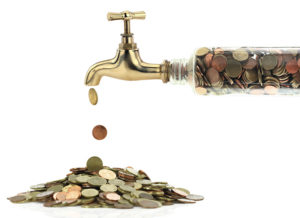Reserve studies are an integral part of maintaining a healthy HOA reserve fund, but many associations underestimate just how important it is. Here is what you need to know about your association’s reserves and how a reserve study affects them.
The Purpose of an HOA Reserve Fund
What is an HOA reserve? Also known as reserve funds or reserve accounts, homeowner association reserves are funds put aside for future use. It is unlike an association’s operating funds in that the latter covers routine or monthly expenses.
What can HOA reserve funds be used for? HOA reserves cover the cost of reserve expenses. What are reserve expenses? These are major replacements, maintenance, and repairs of association property or common elements. Some examples of this include roof replacements, street repaving, and pool retiling.
The lack of a reserve fund can quickly lead to problems for a homeowners association. Without reserves, the HOA board must charge higher special assessments to pay for major repairs and replacements. Other times, the board will have no choice but to take out a loan with a high-interest rate.
If neither option pans out, the board will need to delay the necessary repairs and replacements. When that happens, homeowners will feel dissatisfied with the level of maintenance, curb appeal may drop, and property values may plummet.
Creating and Maintaining HOA Reserve Funds
 Established homeowners associations typically already have reserve accounts. If your HOA is just starting out or does not have a reserve fund yet, though, it is fairly easy to open an account with your association’s bank.
Established homeowners associations typically already have reserve accounts. If your HOA is just starting out or does not have a reserve fund yet, though, it is fairly easy to open an account with your association’s bank.
It is best to keep your operating fund separate from your reserve fund. Whereas operating funds are usually kept in a checking account, HOA reserve funds are better off in an investment or savings account.
You will need to put in an initial deposit, which you can collect from homeowners via dues. From there, your HOA board can start depositing money into the reserve account on a regular basis.
How are reserve funds calculated? Before the start of each year, board members will sit down to create an annual budget. This will include all the projected expenses related to the management of the community. The budget should also include a line item called “reserve fund contributions” to be deposited into the HOA or condo reserve funds. The board shall then divide this amount among all homeowners, including board members, and collect it as part of their monthly dues.
HOA Reserve Fund Requirements
How much should an HOA have in reserves? This is a question many HOA board members ask, and, unfortunately, one with no blanket answer. The appropriate dollar amount in your reserve fund will depend on your association’s size and what kind of common elements your community has.
To consider an HOA’s reserves as fully funded, it must cover the cost of 100 percent of anticipated expenses. More often than not, your governing documents will contain specific language pertaining to the exact HOA reserve funding percent requirement. For instance, your HOA may require you to have at least 80 percent of anticipated expenses in your reserves at any time. But, an acceptable HOA reserves rule of thumb is to remain 70 percent funded at the very least.
If you have yet to set reserve requirements, you need to analyze the following:
- Expenses that will probably arise over the next 30 years that you have yet to budget for;
- The projected cost of those expenses; and,
- The yearly additional savings will be necessary to cover those expenses.
Calculating these items often takes a level of expertise that most board members lack. Therefore, it is typically necessary for associations to seek the help of accountants with experience in performing reserve studies.
What Is an HOA Reserve Study?
A reserve study, within the context of an HOA, examines the association’s assets, projected revenue, and budget to calculate its expected long-term expenses. The study takes into account the association’s current reserves as well as the condition of HOA buildings, equipment, and common elements.
From this information, the accounting professional will then create a schedule consisting of the major maintenance, repairs, and replacements expected to take place over the long-term. Your HOA board can then use this study to determine how much to charge homeowners in reserve fund contributions each year with the goal of maintaining an appropriate balance.
For example, if the study projects that you will need to replace the roof of your clubhouse in 10 years, you will need to start setting aside money to cover the cost of that replacement once it rolls around. If the cost of the roof replacement is $10,000, then you will need to collect $1,000 in reserve fund contributions every year. Simply divide that amount by the number of homeowners in your association to determine how much to charge each homeowner.
Keep in mind that most associations will need to set aside money for more than just one major expense down the line. As such, you will likely need more than just $1,000 each year.
Reserve studies are important because they help give you a near-accurate projection of future costs. This will allow your association to prepare the funds necessary to cover them. They also prevent the need for surprise special assessments and loans.
How Much Does an HOA Reserve Study Cost?
The cost of a reserve study can vary greatly. Factors that can affect the cost include the size of the association, the type of association, and the nature of the common elements. Generally, reserve studies can cost you anywhere between $500 to $10,000. Reserve studies for more complex associations, such as condominiums with many shared elements, typically cost more.
Because a reserve study for HOA communities can be quite expensive, many feel tempted to take a DIY approach. This is discouraged, though, unless you have someone on your board with experience in this field. Reserve studies take time and expertise, so a do-it-yourself reserve study may not give you accurate calculations.
How Often Should an HOA Do a Reserve Study?
There are different reserve study requirements by state. A handful of states have HOA reserve fund laws that dictate how often an association must have a reserve study performed. For instance, California Civil Code Section 5550 dictates that associations should conduct a full reserve study once every three years, at the very least, with updates made on an annual basis.
Even if you live in a state where there is no requirement, though, it is wise to hire a professional to perform an HOA reserve study every few years. Reserve studies not only help preserve the association’s financial health but can also protect your board from potential liability. After all, it is easy for homeowners to make the claim that, by skipping the reserve study, you are failing to act in good faith and within the HOA’s best interests.
HOA Reserves and Taxation
Are reserve funds taxable? Homeowners association reserve funds are not considered taxable income. But, if you use your reserves to pay for operating expenses, you automatically make them taxable.
It is also worth noting that the account in which you put your reserves can determine whether or not it is taxable. If you keep your reserve funds in the same account as your operating funds, then the IRS will deem it as taxable income. Along with setting up internal controls, taxation is a good reason to keep your reserve in a separate, interest-bearing account. Though, the interest you earn on your reserves is still taxable.
Soothing Homeowner Qualms
 In every homeowners association, you will naturally encounter a few members who disapprove of reserve fund contributions. They might question the very need for it or disagree with the amount the HOA intends to collect.
In every homeowners association, you will naturally encounter a few members who disapprove of reserve fund contributions. They might question the very need for it or disagree with the amount the HOA intends to collect.
To quell their fears and disputes, it is necessary for your board to educate all homeowners on the purpose of the HOA reserves. Let them know through various communication channels that the reserves are meant to pay for future costs. Explain this to them in person during meetings and allow time for a Q&A portion, if possible.
You should also make it clear that the association is funding the reserves for the benefit of the community. After all, no homeowner wants to face expensive special assessments when the time comes.
If homeowners feel that the board is misappropriating or miscalculating the reserves, they have a few options for recourse:
- Send a letter of complaint to the HOA board
- Raise the issue at the next open board meeting
- Formally file a request to view reserve-related records or documents
Keep in mind that many states require associations to disclose budgetary information to all members. This typically involves the association’s reserves as well. For instance, Washington law states that the HOA must provide an annual budget report that includes the following:
- Current reserve amounts;
- Estimated reserve balances at year-end;
- Reserve funding plans; and,
- Forecasted future reserve balances after the adoption of the plans.
Turn to the Experts
A lot of association boards find it hard to fully grasp HOA reserve fund accounting, and it is easy to see why. Reserve funds and studies consist of many moving parts. It takes a certain level of expertise to really understand how reserves work. For easier reserve management, it is best to ask for professional help.
Elite Management Services provides reserve planning assistance to homeowners associations of all sizes. Call us today at (855) 238-8488 or contact us online to get a free proposal.
RELATED ARTICLES:
- Is Asking For HOA Special Assessments Allowed?
- What Are Capital Improvements? Should HOA Fund Them?
- HOA Records Security: Ensuring Your Data Is Safe And Secure







